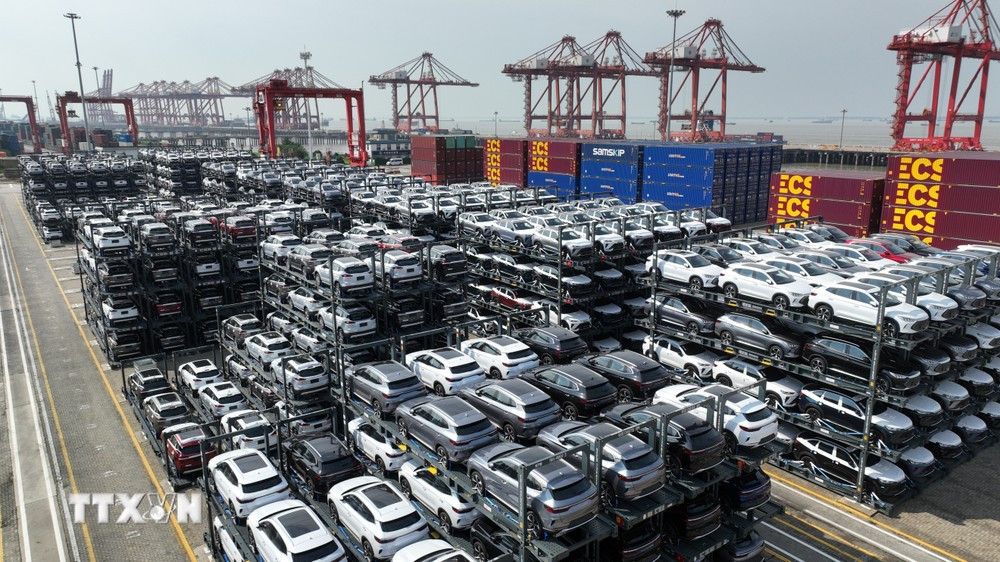China's surge in cheap exports in industries like electric vehicles could create a supply glut that would hurt other economies, the US Treasury Secretary has warned.

US Treasury Secretary Janet Yellen warned on March 27 that China's increased exports of cheap goods in industries such as electric vehicles could create oversupply, harming other economies.
In her speech in the southern US state of Georgia, Ms. Yellen assessed the benefits of US President Joe Biden's landmark Inflation Reduction Act.
At the same time, she highlighted the large business investments that the government has announced for businesses. However, she also raised concerns about the impact that China's excess industrial capacity could have on other countries.
Ms. Yellen said that Chinese government support in areas such as steel and aluminum had previously led to overinvestment and significant overcapacity. That situation forced Chinese companies to seek low-cost exports abroad. While this boosted production and employment in China, industry in the rest of the world was forced to shrink.
Secretary Yellen noted that a similar situation is occurring in new industries such as solar energy, electric vehicles and lithium-ion batteries.
Worryingly, overcapacity could distort global prices and production, affecting many companies and workers.
According to Ms. Yellen, it is important for US officials that American companies and workers can compete on a level playing field. She added that governments and businesses from other countries have raised similar concerns.
In addition, the US Treasury Secretary said that excess capacity also poses risks to China's productivity and economic growth.
American companies have long complained about what they see as an unfair business environment in China. On March 27, the Alliance for American Manufacturing (AAM) called on the government to help stem the “tidal wave” of Chinese imports.
The U.S. must also ensure that Chinese companies cannot use its trading partners as “back doors” into the U.S. market, or distort it by locating manufacturing operations dependent on Chinese supply chains in ways that displace emerging U.S. industries, said AAM President Scott Paul.
Meanwhile, official data from China's National Bureau of Statistics (NBS) showed that companies in the country's industrial sector posted higher profits in the first months of 2024, reinforcing signs that the economy is gradually recovering despite a prolonged slowdown in the real estate sector.
Profits at Chinese industrial companies rose 10.2% in the first two months of 2024 from a year earlier, after a 2.3% drop in profits for the whole of 2023, according to the NBS.
The rise follows upbeat indicators earlier this month that pointed to stabilization in Asia’s largest economy. However, the overall gain was capped by a prolonged slowdown in China’s property sector, which has highlighted the country’s uneven recovery from the pandemic.
If the manufacturing recovery continues, it will contribute to achieving the 2024 growth target, but more policy support is still needed to maintain growth momentum and recovery, said Lynn Song, chief economist for Greater China at ING bank.
Data showed that state-owned companies recorded a 0.5% increase in profits in January-February 2024, foreign companies' profits rose 31.2%, while private sector companies recorded a 12.7% increase.
Zhou Maohua, an analyst at China Everbright Bank, forecasts that industrial companies' profits will continue to rise, but the outlook could be affected by uncertain global demand prospects, volatile prices of energy and other commodities, and supply chain disruptions caused by geopolitical conflicts.
Amid a prolonged economic slowdown, the deputy governor of the People’s Bank of China (PBoC, the central bank) assured markets last week of policy options, including cuts to banks’ reserve requirement ratios (RRR). The PBoC announced the largest RRR cut in two years in January 2024.
The industrial sector's profit figures are based on data from companies with annual revenue of at least 20 million yuan ($2.78 million).
H.Thuy